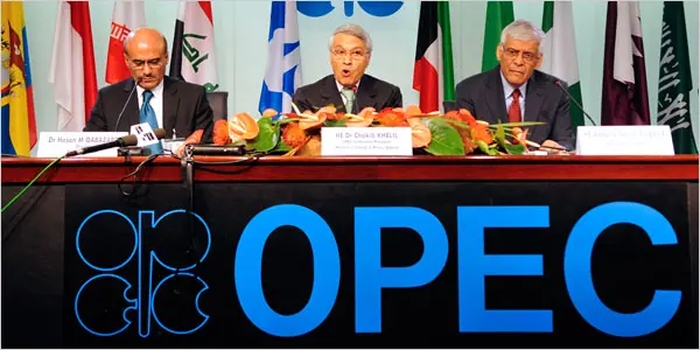By Daniel Lacalle
Commentary
The world is facing a precarious moment in the oil market. The recent decision by OPEC+ to extend production cuts has raised concerns about the potential impact on the global economy. While the move may benefit oil producers in the short term, it may be a misguided action that could also have unintended consequences that could harm the broader economy and oil demand with it.
OPEC should remember that after a burst in oil prices due to unnecessary cuts comes a massive slump due to a recession.
Why did OPEC announce a surprise production cut of 1.16 million barrels per day (bpd)?
First, to defend the price of oil. OPEC has been surprised by the weakness in commodity prices since the June rate cuts. By the end of 2022, oil prices were trading below the level before the Russian invasion of Ukraine. Furthermore, prices continued to slide in the first three months of 2023 due to a weaker recovery than expected from China.
Second, to allow room for rising Iraqi production. Iraq is a member of OPEC, but it is not limited in its production due to the impact of the war. Iraq produced an average of 4.61 million bpd in 2022, according to the Iraq Oil Report. It expects to increase production to 5 million bpd by 2028. As such, Iraq will offset part of OPEC’s production cut with an increase of 500,000 bpd in output.
Third, OPEC was surprised to see a weaker recovery from China, which led the organization to downgrade its global oil demand expectations.
The elephant in the room is money. The biggest driver of oil weakness in 2022 and 2023 was monetary contraction and rate hikes, which trampled over the impact of the Ukraine war and the Russian production cut. Monetary destruction was more than enough to offset geopolitical concerns.
OPEC may be misguided in its production cuts because the demand and monetary pictures have changed significantly.
The International Energy Agency (IEA) expects world oil demand to grow by two million barrels bpd in 2023, to a record 101.9 million bpd, driven mostly by stronger consumption in China. In its monthly report, the IEA cites jet fuel demand as the driver of 57 percent of the 2023 gains. So, the demand picture is stronger than what OPEC thinks.
The monetary picture has changed dramatically as well. The U.S. Dollar Index has weakened as well as the trade-weighted dollar index, according to Bloomberg. Rate hikes and monetary contraction are no longer here. The global money supply has risen back to $104 trillion, as Bloomberg’s proxy shows, while the Federal Reserve has bounced back after meeting the liquidity requirements of troubled U.S. lenders.
Demand and monetary aggregates deny the need to cut supply. The extended cuts raise concerns that the market may be artificially inflated, which could lead to a supply crunch and a spike in oil prices that becomes the final element required to create a recession.
Higher energy prices drive up the cost of production for many industries, which can lead to reduced economic growth in an already weak manufacturing sector, lower employment, and perpetuate inflation. A recession in Europe and the United States would slash OPEC’s hopes of a stable oil price above $80 a barrel. A deep recession in developed economies could slash oil prices even below $60 a barrel, as we have seen in previous crises, as the economic impact of an abrupt oil price hike extends to more than developed economies. Emerging economies weaken when their exports fall due to poor demand in developed markets.
Production cuts in a crisis are a tool to balance the market. Production cuts in a recovery are a tool to create distortions and destroy the economy—and oil prices with it. Supply cuts create a false sense of stability in the market, which makes oil-producing countries delay any change in their economic model and reduce the incentive for investment in alternative energy and economic growth sources.
Production cuts only lead to stagnation in oil-producing economies overall.
Moreover, the OPEC+ production cuts could lead to rising geopolitical tensions, as some countries may feel unfairly disadvantaged by the cuts. This is already creating a shift toward protectionist policies, which undermine global trade and economic growth. The U.S. government may perceive these production cuts as a threat to the domestic economy, but North America is mostly energy independent in oil and gas. However, the European Union and other economies may perceive these cuts as a direct attack on their economies. We must remember that the logical reaction to an oil supply crisis is to accelerate diversification of supply and alternative technologies, especially when they are unnecessary and artificial.
When OPEC sends a negative message to its clients, the response is inevitably going to be to use their products less. If the message is “we want higher prices regardless of economic consequences,” the diversification response will be fast and aggressive.
The rise of renewable energy and the increasing prevalence of electric vehicles are inevitable. These factors could lead to a fundamental shift away from oil as a primary source of energy, which could ultimately lead to a long-term decline in demand and prices. OPEC needs to learn to be efficient and take advantage of the changes in technology. According to the IEA, OPEC’s production mostly services domestic demand, so supply cuts can even damage their local economy.
Policymakers and businesses must take a long-term perspective on the energy market and make the most of innovation, technology, diversification, and security of supply. Investing in sustainable, efficient, and abundant energy sources is the main step to mitigate the risks of market distortion.
Oil-producing countries must remember that the worst they can do is put at risk their customers’ perception of their role as reliable and competitive suppliers. If OPEC is seen as greedy and uncompetitive, their future is doomed.
While the OPEC+ production cuts may provide short-term benefits for oil-producing countries, they also create much larger negative implications for them in the future as well as significant risks for the global economy. OPEC does not benefit from a crisis and certainly may hurt its own strategy by pursuing unnecessary cuts.






